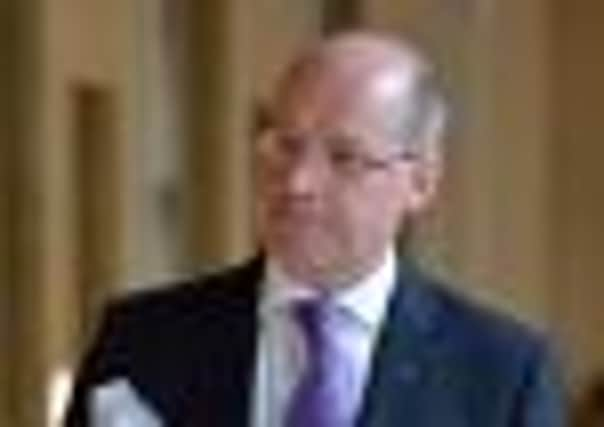Euan McColm: Swinney budget more notable for what it didn’t say than what it did


His reputation as solid and dependable was of little use to a man who once challenged to become Scotland’s First Minister. But it’s a perfect fit for a politician who holds the purse strings. It gives him leeway.
Since 2007, Swinney has delivered a series of budgets that have frozen council tax and protected public sector jobs from compulsory redundancies. It’s been an impressive, sustained performance, during which a series of opposition finance spokespeople have failed to trouble him.
Advertisement
Hide AdAdvertisement
Hide AdSo when Swinney announced his draft budget at Holyrood this week, it was against an ongoing narrative that says he knows what he’s doing. I have no doubt he did. His plan displayed a clear vision. But how deliberately short-sighted it was.
The Finance Secretary may have described it as a “Scottish budget for jobs and growth”, but in reality it was a purely political draft budget, designed to make as few waves as possible. There was £180 million for “economic stimulus” – a decent headline figure – but on Thursday, Swinney really told Scots that life would carry on as normal, without answering big questions about the long term.
He reiterated promises on council tax freezes, no tuition fees for Scots students, police numbers, free prescriptions. He even found an opening gambit of a 1 per cent pay rise for public sector workers (bet on that rising to 1.2 per cent or thereabouts by the start of 2013). And all belt tightening was the fault of Westminster.
Swinney’s explanation there depends on the continued misapprehension by some (though I struggle to meet them in real life) that the banking collapse was a little local difficulty, and not a global catastrophe for which everyone will be paying, regardless of who sits in Westminster or elsewhere, for years to come.
Swinney’s draft budget conspicuously lacked any hint of radical reform, which these difficult times surely demand. It shied away from difficult issues which the Finance Secretary, quite understandably, would rather not discuss at the moment. So, we have something on public sector pay but nothing that addresses the issue of why Scotland, with all its financial constraints, continues to fund a full 32 local authorities.
Nor did the Finance Secretary reassure me, particularly, that the ongoing absence of tuition fees for students is sustainable for any length of time. The message that he’s doing his best and everything will be great post independence is all he really seems to be able to offer when it comes to costly projects with no visible means of long-term support.
Swinney is a clever man. That is a widely held and perfectly correct opinion. What fewer people seem to realise is quite how politically ruthless he can be. Swinney is a careful thinker but once he has considered his options, he’s not sentimental. As party leader between 2000-04, he took on a hostile membership over SNP reform. Swinney has the ability to recognise problems and the steel to see through difficult solutions.
But he will not take on a challenge that stands to harm his political ambitions. Not where independence is concerned.
Advertisement
Hide AdAdvertisement
Hide AdWe see this in his draft budget, which is the work of a man absolutely focused on the 2014 referendum. His announcements won’t scare voters, but reassure that there’s no revolution on the horizon. Independence? That’s just devo max with better weather – jump in. In this instance, he is being ruthlessly cautious – putting the needs of the independence campaign before the need for reform.
Swinney has the benefit – when it comes to council tax and tuition fees – of having two extraordinarily popular policies. Free stuff is a guaranteed winner.
But careful souls might cast their minds back a few years to when cash was swilling and most people had at least three mortgages and a Smeg fridge on tick, and the Labour/Lib Dem Scottish Executive introduced free personal care for the elderly.
This policy, championed by then first minister Henry McLeish alone among Labour cabinet ministers, has soared in cost. It was recently announced that the cost of free personal care has risen by 150 per cent, from £133m in 2003-4 to £342m in 2010-11. It is an unsustainable policy that, some day, is going to have to go. Defending the unaffordable by insisting “but it’s who we ARE” is not a serious long-term strategy.
And that was a giveaway decided long before banks were crumbling into the sea.
Swinney’s draft budget, with its mix of caution and baby carrots, suggests to me that the SNP is treating the 2014 independence referendum like a by-election, with no danger that anything difficult or troublesome will be discussed in close proximity.
Within the SNP, I detect some concern at this state of affairs. Some activists are frustrated that the Government is unwilling to start looking at reform while all the signs are that funding from Westminster is going to continue to drop. Little good, they argue, adopting an approach of simple maintenance at a time of overwhelming change.
Will the Scotland that exists on the day after the referendum – regardless of the result – be fit for purpose?
Advertisement
Hide AdAdvertisement
Hide AdI cannot see how this ceases to be a problem for the Nationalists as we move towards 2014. Scotland’s public services have not moved with the times. The structures are outdated and the costs stand to return poorer value each year until something gives.
Nationalists will continue to make the break-up of the UK the answer to all of the financial problems facing Scotland. Who knows, they might just succeed in selling that message come 2014. But if the Government continues to avoid challenging reform, the Scotland a victorious SNP inherits from itself may be in a parlous state.